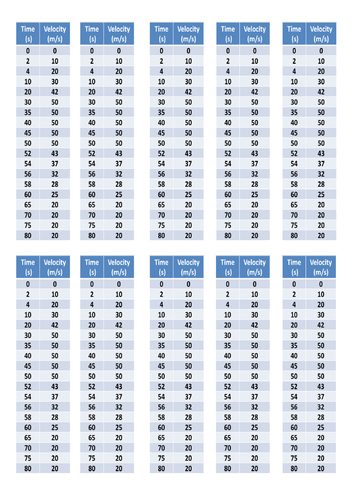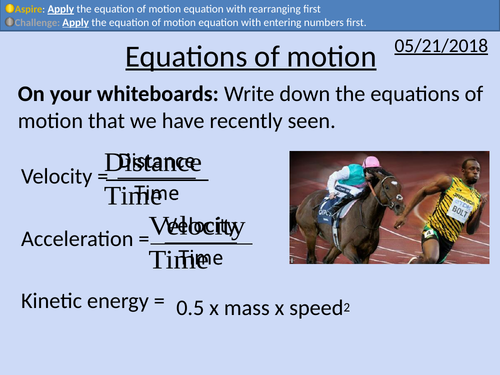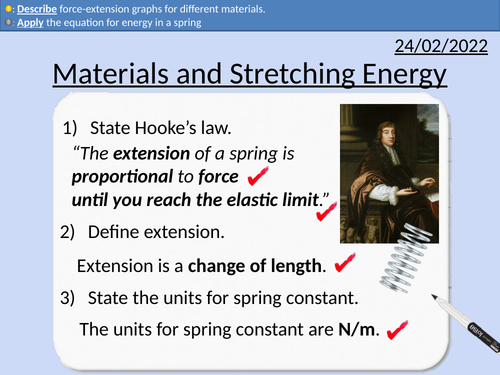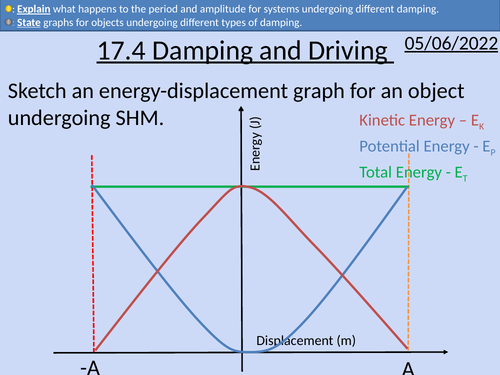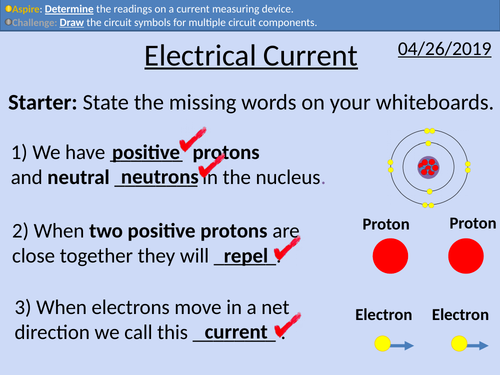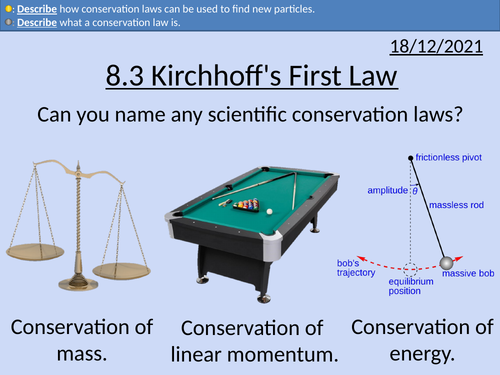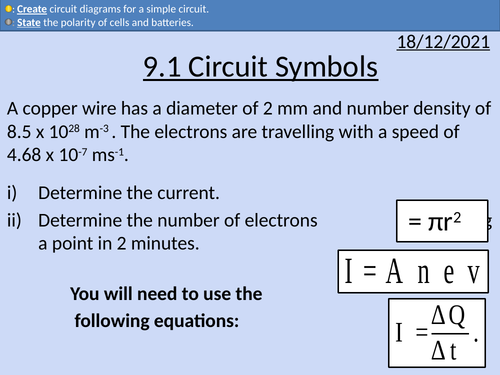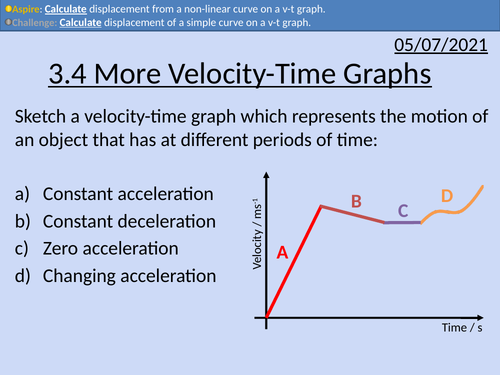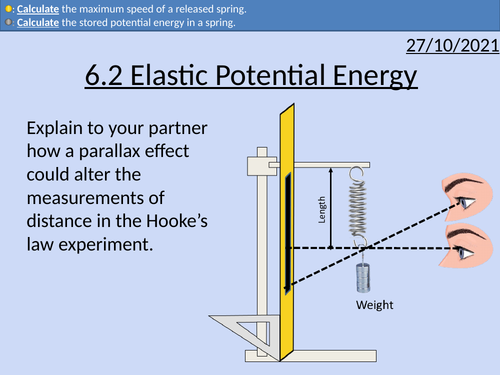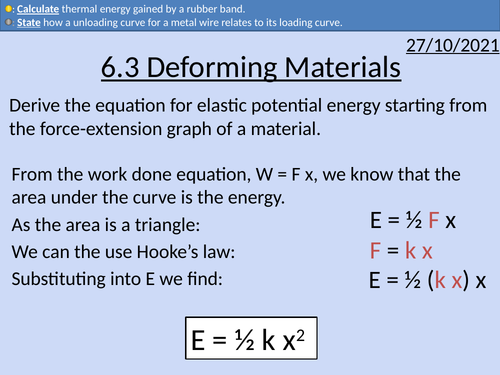497Uploads
169k+Views
72k+Downloads
All resources

GCSE Physics: Momentum
This presentation covers OCR Gateway Physics 9-1 P2.2.6
Momentum Equation
Rearranging the momentum equation
Momentum as a vector
Vector addition with momentum
Exam question with worked solutions
Student problems with answers
Proportionalities

GCSE Physics: Every Day Forces
This presentation covers OCR Gateway Physics 9-1 P2.2.5
Presentation comes with worked examples, student questions and answers.
Newton’s first Law
Terminal velocity
Free body diagrams
Plotting data
Determining acceleration for a velocity-time graph
Determining distance traveled for a velocity-time graph

GCSE Physics: Equations of Motion
This presentation covers GCSE Physics OCR Gateway P2.1.6
Introduction of final speed^2 – initial speed^2 = 2 x acceleration x distance
Rearranging of final speed^2 – initial speed^2 = 2 x acceleration x distance
Derivation of final speed^2 – initial speed^2 = 2 x acceleration x distance
Three different methods for rearranging equations
Kinetic energy, acceleration and speed problems with answers

GCSE Physics: Springs and Energy
This presentation covers OCR Gateway Physics 9-1 P2.3.2
• Spring Energy Equation
• Rearranging equation with two methods
• Problems and worked solutions
• Exam style question and answer
• Analysing force-extension graphs
Bundle

GCSE OCR Physics: P2.2 Newton's Laws
All resources for P2.2 GCSE OCR Physics Gateway 9-1.Triple and comined (Higher and Foundation) is covered in this material.
Includes:
Forces and Interactions
Free Body Diagrams
Newton’s First Law
Newton’s Second Law
Everyday Forces
Momentum
Work Done and Power
Bundle

GCSE OCR Physics: P2.1 Motion
All resources for P2.1 GCSE OCR Physics Gateway 9-1.Triple and combined (Higher and Foundation) is covered in this material.
Includes:
Distance, time and speed
Vectors and Scalars
Acceleration
Distance-time graphs
Velocity-time graphs
Equations of motion
Kinetic Energy

OCR A Level Physics: Damping and Driving
OCR A Level Physics: Damping and Driving presentation with homework and answers

GCSE Physics: Acceleration Practical
This PowerPoint presentation with worked examples and student questions covers:
• Acceleration experiment protocol
• Ensuring results are reproducible and repeatable
Spotting and removing anomalies.
Rearranging equations

GCSE Physics: Electrical Current
This PowerPoint presentation with worked examples and student questions covers:
• Circuit symbols
• Conditions for current to flow
• Measuring current in series circuits
• Measuring current in parallel circuits.

OCR AS level Physics: Kirchhoff's First Law
OCR AS level Physics: Kirchhoff’s First Law is a part of the Module 4: Electrons, Waves, and Photons.
Presentation come with worked examples, solutions and homeworks
Apply Kirchhoff’s First Law
Kirchhoff’s First Law in mathematical form
Kirchhoff’s First Law in written form
Describing conservation laws
Women in Science - Emmy Noether
CERN and jobs in physics

OCR AS level Physics: Circuit Symbols
OCR AS level Physics: Circuit Symbols is a part of the Module 4: Electrons, Waves, and Photons.
Presentation come with worked examples, solutions and homeworks.
All circuit symbols required for OCR A level physics
Polarity of cells and batteries
Electron flow and conventional current

OCR AS level Physics: More Velocity-Time Graphs
OCR AS level Physics: More Velocity-time Graphs is a part of the Module 3: Forces and Motion
Presentation come with worked examples, solutions and homeworks.

OCR AS level Physics: Stopping Distances
OCR AS level Physics: Stopping Distances is a part of the Module 3: Forces and Motion
Presentation come with worked examples, solutions and homeworks.

OCR AS level Physics: Free fall and g
OCR AS level Physics: Free fall and g is a part of the Module 3: Forces and Motion
Presentation come with worked examples, solutions and homeworks.
Definition of free fall and gravitational force.
Dimensional analysis of units for acceleration and g.
Determining g with equations of constant acceleration (suvat equations).
Determining g with finding the gradient of graphs.
Determining g experimentally with stopwatches, trap doors, light gates, and cameras with strobes.

OCR AS level Physics: Force, mass, and weight
OCR AS level Physics: Force, mass, and weight is a part of the Module 3: Forces and Motion
Presentation come with worked examples, solutions and homeworks.

OCR AS level Physics: Free body diagrams
OCR AS level Physics: Free-body diagrams is a part of the Module 3: Forces and Motion
Presentation come with worked examples, solutions and homeworks.

OCR AS level Physics: Elastic Potential Energy
OCR AS level Physics: Elastic Potential Energy is a part of the Module 3: Materials
Presentation come with worked examples, solutions and homeworks.

OCR AS level Physics: Deforming Materials
OCR AS level Physics: Deforming Materials is a part of the Module 3: Materials
Presentation come with worked examples, solutions and homeworks.

OCR AS level Physics: Superposition
OCR AS level Physics: Superposition of Waves is a part of the Module 4: Electrons, Waves, and Photons. PowerPoint with worked examples and homework.

OCR AS level Physics: Harmonics
OCR AS level Physics: Harmonics is a part of the Module 4: Electrons, Waves, and Photons. PowerPoint with worked examples and homework.


